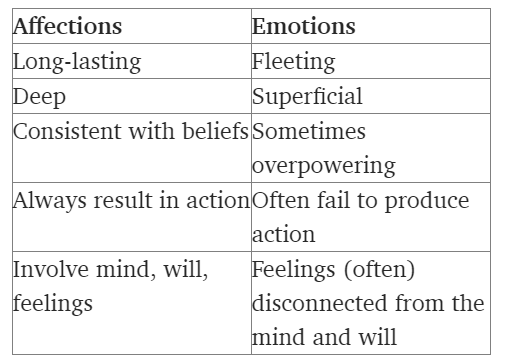행동의 근거에 대한 연구, 사람은 어떻게 행동할까요? 행동의 주체가 인간에게로 옮겨지면서 개인 행동의 주체에 대한 연구는 쉬지 않습니다. 행동의 주체가 계급에 있을 때에는 행동의 주체 문제는 크게 문제되지 않았습니다. 그런데 인식과 행동이 개별화가 되면서 인식과 행동의 주체가 된 개인은 자기 인식과 행동의 근원에 대해서 명확하게 파악해야 될 책임이 부여되었습니다. 그 책임을 파악하지 못하면 인격괴리현상이 발생하는 것 같습니다. 그래서 현대에서는 인격괴리현상을 정상으로 여긴 것으로 생각합니다. 그래서 다양한 변이들도 모두 정상으로 평가하고 일상을 진행하고 있습니다. 그러나 행동하는 인간은 자기 행동의 근거를 정확하게 파악해야 합니다. 탁월한 인격은 자기 행동의 근거를 가변적 가치를 두는 훈련을 합니다. 근거가 없이 행동하는 것이 매우 불안하고 확실성을 두지 않기 때문입니다. 그러나 합당한 인격은 자기 행동의 근거를 정확하게 밝히는 훈련을 합니다. 이러한 갈등은 18세기에 더 선명하게 발생합니다.
18세기 이전까지 인간 행동의 근거는 affection이라고 생각했는데, 그 이후부터는 emotion으로 생각하는 것으로 보입니다. 이것을 믿음이라고 표현하기도 하는데, 믿음(faith)과 effection and emotion은 같지 않습니다. 기독교에서는 믿음을 하나님께서 주신 선물, 곧 하늘의 성격으로 봅니다. 그러나 effection과 emotion는 인간의 특성입니다. 기독교는 하늘의 성격과 땅의 인간의 성격의 융화를 설명할 수 없습니다. 그러나 사람에게 그러한 현상이 발생하고 있는데, 그것을 믿음이라고 합니다. 믿음의 목적은 믿음을 주신 분을 믿고 의지하며 전파하여 영광을 돌리는 것입니다.
우리는 affection 번역을 매우 어렵다는 것을 잘 알아야 하며, 지금은 affection 개념을 잘 인지하지 못한다는 것도 알아야 합니다. 우리나라에서는 affectus라는 스파노자(Baruch Spinoza, 1632-1677) 어휘 번역에 여러 논문이 있습니다. 정동, 정서 등 다양한 번역어 제의가 발표되었습니다. 즉 감정이라고 번역할 수는 없다는 것입니다. 그런데 조나단 에드워즈(Jonathan Edwards, 1703-1758)가 1746년에 집필한 『신앙과 정서』(Treatise Concerning Religious Affections)는 다른 번역으로 신앙감정론으로 출판되기도 했습니다. affectus라는 어휘는 루터와 칼빈의 글에서도 등장합니다. 번역은 교차되는데 대부분 정서로 번역되는 경향입니다. 그것은 감정과 명확하게 구분하기 위한 것으로 보입니다. '정서'라는 어휘를 만나면 좀 더 숙고해야 합니다.
저는 affection을 만나면 행동의 근거, 행동의 시작점으로 이해하고 있습니다. 19세부터는 affection에서 emotion으로 바뀐 것으로 이해합니다. 슐라이어마허(Schleiermacher, 1768-1834)는 절대 의존 감정(Feeling of Absolute Dependence)을 행동의 기초로 세웠습니다. 이러한 패턴을 내재적 신앙(inner faith)이라고 합니다. 즉 믿음을 인간 내면에서 나온 산물로 결정했기 때문입니다.
우리는 믿음의 증진을 믿음의 말씀으로만 증진된다고 주장하고 있습니다(롬 10장). 그러나 내재적 신앙에서는 극단적으로는 외부의 자극없이 혹은 외부의 자극을 부정하면서 스스로 내면의 각성으로 수행하려는 신비주의가 있고, 외부의 어떤 자극에 관련하지 않고 모든 자극을 선으로 판단하고 그 자극에서 내면의 각성을 일으키려는 신비주의가 있습니다.


형람서원 고경태
What Is the Difference between Affections and Emotions?
JUSTIN TAYLOR | MAY 3, 2013
As Gerald McDermott explains, Jonathan Edwards saw affections as “strong inclinations of the soul that are manifested in thinking, feeling and acting” (Seeing God: Jonathan Edwards and Spiritual Discernment, p. 31).
A common confusion is to equate “affections” with “emotions.” But there are several differences, as summarized in this chart from McDermott (p. 40):

사진 설명을 입력하세요.
Affections Emotions
Long-lasting Fleeting
Deep Superficial
Consistent with beliefs Sometimes overpowering
Always result in action Often fail to produce action
Involve mind, will, feelings Feelings (often) disconnected from the mind and will
He explains why affections are different than emotions:
Emotions (feelings) are often involved in affections, but the affections are not defined by emotional feeling. Some emotions are disconnected from our strongest inclinations.
For instance, a student who goes off to college for the first time may feel doubtful and fearful. She will probably miss her friends and family at home. A part of her may even try to convince her to go back home. But she will discount these fleeting emotions as simply that—feelings that are not produced by her basic conviction that now it is time to start a new chapter in life.
The affections are something like that girl’s basic conviction that she should go to college, despite fleeting emotions that would keep her at home. They are strong inclination that may at times conflict with more fleeting and superficial emotions. (pp. 32-33)
Here is how Sam Storms explains the difference in Signs of the Spirit: An Interpretation of Jonathan Edwards’ “Religious Affections:
Certainly there is what may rightly be called an emotional dimension to affections. Affections, after all, are sensible and intense longings or aversions of the will. Perhaps it would be best to say that whereas affections are not less than emotions, they are surely more.
Emotions can often be no more than physiologically heightened states of either euphoria or fear that are unrelated to what the mind perceives as true.
Affections, on the other hand, are always the fruit or effect of what the mind understands and knows. The will or inclination is moved either toward or away from something that is perceived by the mind.
An emotion or mere feeling, on the other hand, can rise or fall independently of and unrelated to anything in the mind.
One can experience an emotion or feeling without it properly being an affection, but one can rarely if ever experience an affection without it being emotional and involving intense feelings that awaken and move and stir the body. (p. 45)

Correcting a misunderstanding about Jonathan Edwards' understanding of the affections.
www.thegospelcoalition.org
UNIT 4 FEELINGS, AFFECTION AND EMOTION
Structure 4.0 Introduction
4.1 Objectives 4.2 Emotion, Feeling and Affection 4.2.1 Definition of Emotion 4.2.2 Emotion and Affection 4.2.3 Definition of Feeling 4.3 Difference between Emotion and Feeling 4.3.1 Overlap between Emotions and Feelings 4.3.2 Caring and not Caring about Feelings 4.4 Definition of Affection 4.4.1 Difference between Emotion and Affection 4.4.2 Approaches to Affection 4.4.3 Approaches to Studying Affectionate Communication 4.4.4 Affection and its Effects 4.4.5 Affection as Social Help 4.4.6 Signs of Affection 4.4.7 Emotion of Love or Affection 4.5 Emotion and Thought 4.5.1 Emotions are Complex 4.5.2 Emotions can Direct and Control Thoughts 4.5.3 Emotions and Feelings are Broad Thoughts 4.5.4 Emotion is a Combination of Feelings and Thoughts 4.5.5 Emotions are Derived from Feelings 4.5.6 Feelings Unites with Mind to Generate Emotions 4.6 Influence of Value 4.7 Let Us Sum Up 4.8 Unit End Questions 4.9 Suggested Readings
https://egyankosh.ac.in/bitstream/123456789/23769/1/Unit-4.pdf

사진 설명을 입력하세요.
'형람서원' 카테고리의 다른 글
| 중조설(重造說, gap theory) (0) | 2024.07.03 |
|---|---|
| 웨스트민스터신앙고백서를 자기 표준문서대로 해야 한다고 말하지 못하는 장로교 교단 (1) | 2024.07.01 |
| 기독교와 정통신학 (1) | 2024.06.11 |
| 믿음의 법칙..에 대해서... 고경태 (0) | 2024.06.04 |
| 신약성경 휘포스타시스 - ὑπόστασις (hypostasis) (0) | 2024.04.27 |